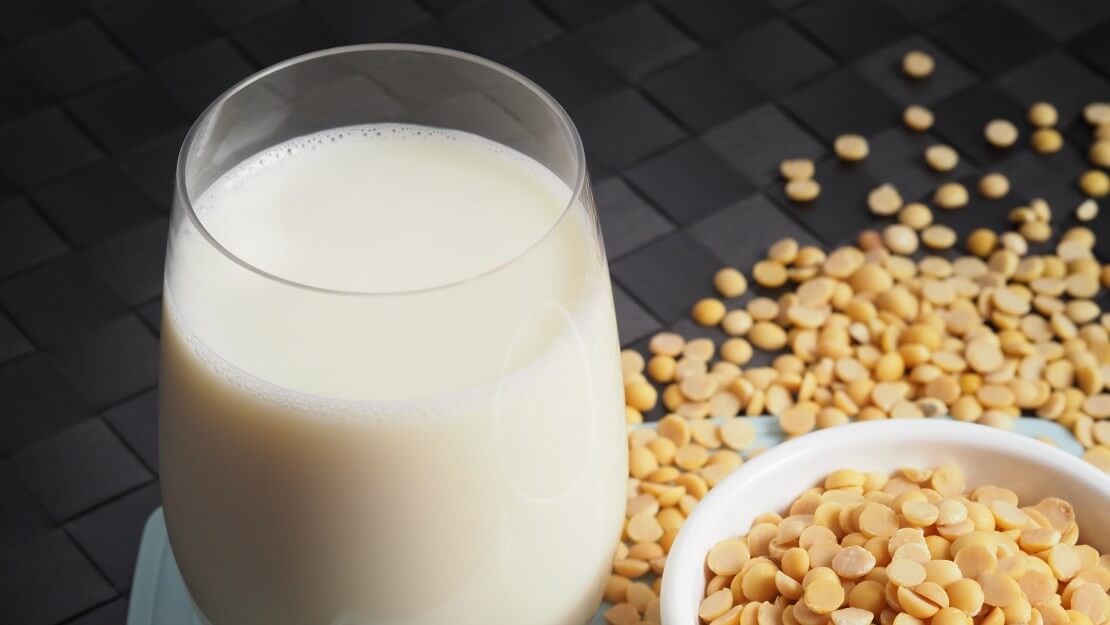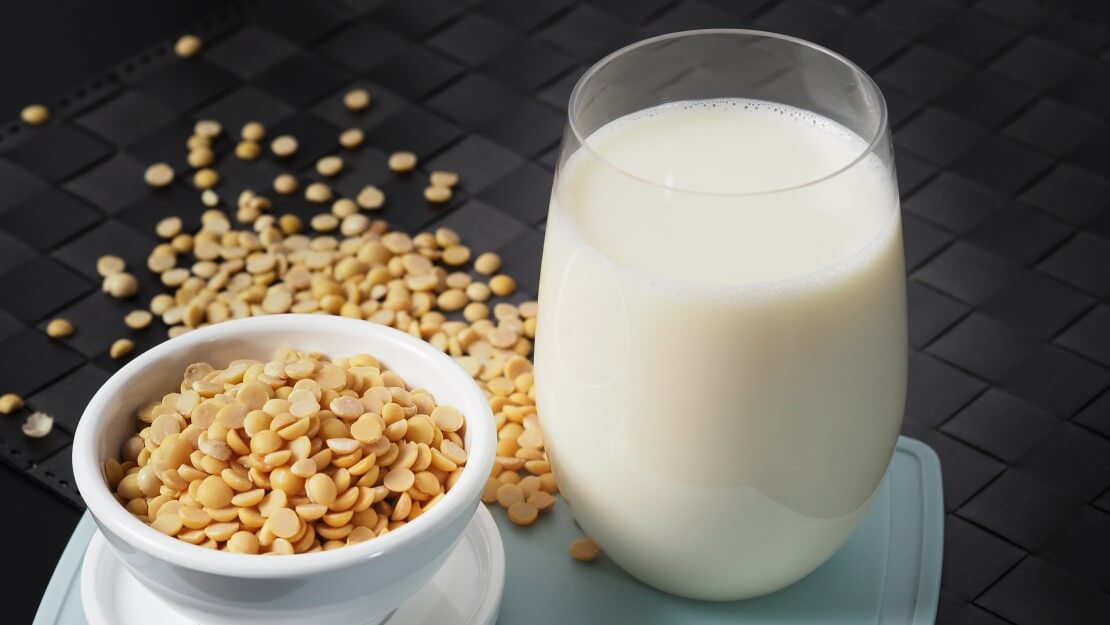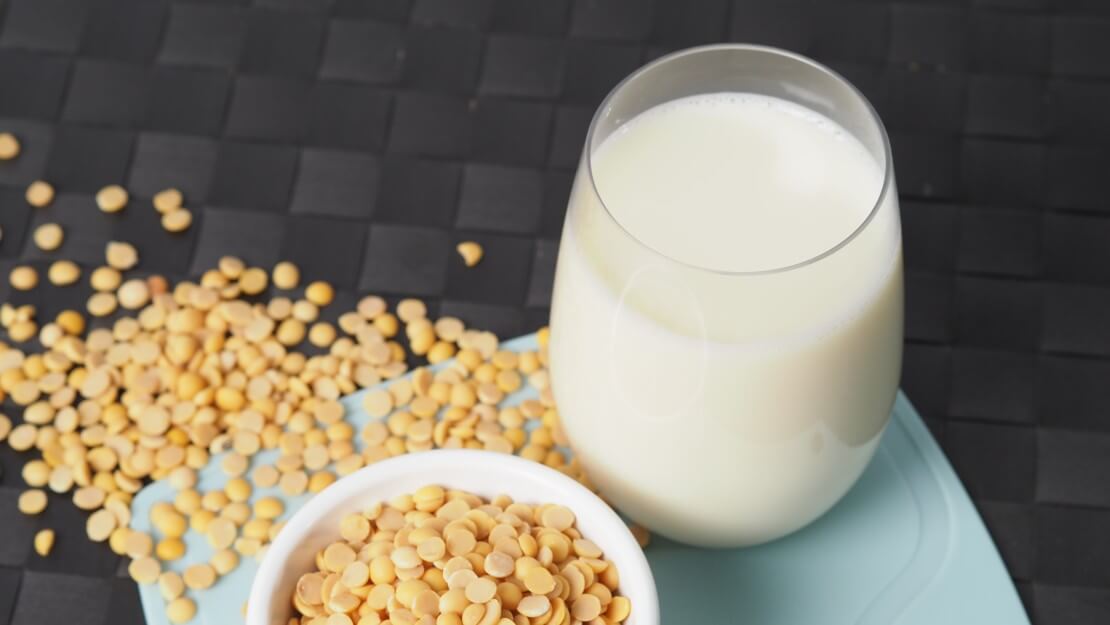Soy Milk
Brain Health
Soy milk contains omega-3 fatty acids, which may help long-term brain health.
Protein
Soy milk is one of the most protein-rich non-dairy milks.
Menopause
Soy milk contains isoflavones which may help with menopause symptoms.
From almond to quinoa, from cashew to rice, the milk aisle has grown over the past decade!
Even so, no one can deny that the non-dairy milk alternative that got there first was delicious, protein-packed soy milk! This protein-rich plant-based milk has graced the shelves since the nineteenth century, and there's a good reason for that!
But what is soy milk?
Soy milk is a creamy, nutritionally dense dairy substitute that you can swap with cow's milk in nearly any recipe, from your morning latte to your favorite baked goods. It's a sustainable, heart-healthy alternative to dairy that Americans love. As technology has improved, so has the texture and flavor of the original non-dairy milk!
Are you thinking about joining the masses and making the switch to non-dairy milk?
Keep reading to learn everything there is to know about silky and scrumptious soy milk!
What is Soy Milk?
Soy milk is a plant-based milk substitute, which you can use in place of cow's milk in nearly any recipe.
Soy milk is made using soybeans, an edible plant that is native to East Asian countries.
Soybeans are inexpensive and easy to grow in high quantities. That makes them one of the most valuable plants in the world for nutritional and industrial use.
You make soy milk by soaking these beans in water overnight, then grinding them.
Then you add more water during the grinding process to create a milk-like product.
At this stage, the milk can be further processed into soy milk, or become other soy-based products such as tofu.
The biggest benefit of drinking soy milk is its nutritional similarity to low-fat cow's milk.
Unlike many of the other non-dairy milk products on the market, soy milk contains a considerable quantity of both fat and protein.
Soybeans are also notable for containing all the amino acids that humans need to thrive.
Additionally, store-bought soy milk is often further fortified during production to include additional vitamins and nutrients, such as vitamin A, vitamin B-12, vitamin D, and calcium.
Check out our Soy Milk 101 videos below for more information!
What Does Soy Milk Taste Like?
Soy milk has a mild flavor, without too many notable undertones. This is the result of a steaming process that neutralizes more bitter notes during processing. When purchased at the store, soy milk is often sweeter than other types of plant-based milk, as it has more added sugar.
As soy milk rose to popularity in the 80s and 90s, it's available in many flavors, from chocolate to eggnog.
What's The Texture of Soy Milk?
Soy milk is incredibly creamy, and even tends to cling to the side of a glass or bowl!
It's favored among coffee drinkers, as it froths easily. This quality makes it ideal for steamed coffee beverages like lattes.
Soy Milk Nutrition Facts
Soy milk is a nutritionally dense plant-based beverage. Here are the nutrition facts for 100 grams of unsweetened, shelf-stable soy milk, according to the USDA.
Soy Milk Nutrition Facts | |
|---|---|
Calories | 38 |
Protein | 4g |
Fat | 2g |
Carbohydrates | 1g |
Fiber | <1g |
Sugar | 1g |
Calcium | 101mg |
Potassium | 158mg |
Vitamin D | 27.2 IU |
Vitamin B-12 | 0.39µg |
Vitamin A | 58 µg |
The nutrition facts for your soy milk might vary depending on the brand you buy, or the ingredients you use if you make it at home. Pay particular attention to the sugar content of store-bought soy milk. The amount of sugar tends to vary across brands.
The Benefits of Soy Milk
Soon after the end of WWII, some called soy milk "the milk of the future."
Many consumers believed that this sustainable, plant-based dairy substitute could disrupt the food chain and provide inexpensive, efficient nutrition to the masses.
Soybeans were often fed to livestock, so some believed you could "bypass the cow" by making their feed directly into milk.
This would provide a solution to the ethical and health concerns inherent in procuring cow's milk.
It did not catch on right away, as soy milk had a reputation as an "austerity" food.
Scientists who believed in the power of soy continued working hard to perfect everything from the flavor to the nutritional density.
Today, soy milk has become both a delicious and nutritious option.
Here are some of the health benefits you will experience if you add soy milk to your diet today.
Soy Milk Is Lactose-Free
Soy milk was one of the first types of non-dairy milk available for individuals suffering from lactose intolerance. It does not contain any lactose.
Soy Milk Is Plant-Based and Vegan Friendly
Soybeans are some of the heartiest and most sustainable crops on the planet.
They're easy to grow and harvest and have many uses, even beyond their use as food!
Best of all, they're a plant, making soy milk completely safe for those following a vegan diet.
Soy Milk Contains Lots of Protein
Most other types of plant-based milk, such as nut milk, average 1 gram of protein per cup.
In contrast, 1 cup of soy milk contains about 4 grams of protein on average, and often more if it has been fortified with more protein!
Protein is essential in the healthy development of healthy muscles and organs. It's responsible for repairing cells and making new ones.
Soy Milk May Impact Brain Health
Hearing that soy milk contains fat might give you pause, but the kind of fat it contains is the "good" kind!
The human body cannot make omega-3 fatty acids, which are responsible for long-term brain health.
They can reduce your risk of neurological conditions such as Alzheimer's disease and dementia.
Soy Milk Has Positive Effects During Menopause
Soy milk also contains isoflavones, which have the same bodily function as a weakened form of the hormone estrogen.
Studies suggest that a plant-based, soy-rich diet can have positive effects on the symptoms of individuals undergoing menopause.
This includes a reduction in
- Hot flashes
- Night sweats
- Flushes
The Downsides of Soy Milk
Soy milk is the grandfather of the non-dairy milk revolution, so it has been the subject of many studies.
Thus, we have more information about the long-term health effects of consuming soy products, including soy milk.
You might have heard that soy milk can increase the risk of breast cancer in humans. Another rumor is that individuals recovering from breast cancer should avoid soy milk. This is not the case.
This information comes from a study conducted on rodents. The rodents consumed soy in quantities beyond what an average human could consume.
While studies are ongoing, there is no link between soy consumption and breast cancer in humans.
Here are a few of the founded concerns that consumers face when deciding whether soy milk is the right dairy substitute for their lifestyle.
Soy Milk May Contain Added Sugar
Soy milk begins its life as a bean, and while its flavor is generally mild, the creamy consistency gets a boost when it's sweetened.
Thus, many brands of store-bought soy milk contain added sugar, which can negate many of the other health benefits.
To avoid added sugars, you can buy unsweetened soy milk or make your own at home.
Soy Is a Common Food Allergen
Soybeans are on the list of the top nine food allergies, according to Food Allergy Research and Education.
While you can incorporate it into nearly any diet, those with allergies must avoid it.
How To Make Soy Milk
If you want to have full control over the nutritional content of your soy milk, your best bet is to learn to make it at home.
It's a simple process that will yield a steady supply of soy milk that you can enjoy as a breakfast beverage or incorporate into all of your favorite recipes!

Ingredients
- Soybeans
- Water
We recommend yellow soybeans for this process. If you wish, you can add some natural sweetness using dates, or some vanilla bean for flavor.
Equipment Needed
- High-speed blender
- Nut milk bag (or cheesecloth, napkin, or mesh strainer)
- A large pot or saucepan
Your nut milk bag is a great investment if you plan to continue to experiment with homemade milk. You will also want an airtight container in which to store your milk.
Instructions
Step 1
Soak 80 grams of dried yellow soybeans in water overnight.
Step 2
Drain and remove the skins
Step 3
Add the drained, skinned beans to the blender with 3 cups of water and blend until almost smooth.
Step 4
Strain the mixture
Step 5
Pour into your saucepan with an additional cup of water and bring to a boil.
Step 6
Stir the mixture and skim off the foam.
Step 7
Reduce the heat to medium and continue cooking for about 20 minutes. Stir the mixture occasionally.
Step 8
If you wish to add vanilla bean or dates, do so now.
Step 9
Let the soy milk cool. If you have added anything, you may wish to blend it again after cooling.
Step 10
Store in a sealed container in the refrigerator.
Feel free to adjust the amount of water you use until you're happy with the finished texture of your milk. Your soy milk will stay fresh in a sealed container for up to five days.
More of a visual learner? Here's a video that walks you through how to make soy milk!
Soy Milk Recipes
Now that you have plenty of soy milk on hand, you're probably looking for clever and delicious ways to use it!
You can substitute soy milk in nearly any recipe that asks for cow's milk. Here are a few of our favorite soy milk recipes!

Soy Milk Smoothie Bowl
Smoothie bowls are taking the world by storm! You can top these delicious spoonable smoothies with all your favorite toppings, from fruit to nuts to granola! Soy milk adds a delicious pop of protein and creaminess to your favorite smoothie bowl base.
We love the simplicity of this Strawberry Banana smoothie bowl from Aline Made.
Related: Is There Milk in Acai Bowls?
Soy Milk Vegan Hot Cocoa
The creamy texture of soy milk makes it the perfect base for sweetened drinks, including cocoa!
If you're attracted to soy milk for its plant-based qualities, you'll love to use it to make a vegan version of hot chocolate. We're fans of the all-vegan recipe from Loving It Vegan.
Soy Milk Ice Cream
If you're lactose-free, there is no reason to eliminate delicious ice cream from your diet!
Soy milk makes for a scrumptious base for any flavor you can dream of! You don't even need a special ice cream machine to achieve a dreamy texture and enjoy your favorite frozen dessert again!
We took inspiration from this collection of soy milk ice cream recipes over at Tastessence.

Soy Milk FAQ
Do you still have questions about the benefits of soy milk? We've gathered the answers to some of the most frequently asked questions below.
Is Soy Milk Good for You?
Yes! Soy milk contains complete plant protein and omega-3 fatty acids, as well as many vitamins and minerals! It even has preventative antioxidants and fiber, which help with overall health.
The only major disadvantage is soy milk's high sugar content. If you make soy milk at home, you will have more control over this!
Is Soy Milk Healthier Than Regular Milk?
The biggest difference between soy milk and low-fat cow's milk is calcium content. Soy milk does not naturally contain calcium. Those who switch from dairy to soy will want to ensure they get calcium from another source.
Soy milk is lower in calories than regular milk, however. Many individuals switch to soy milk when they are trying to lose weight.
Is It OK to Drink Soy Milk Every Day?
It should be fine to drink soy milk every day. Even so, you should be aware of how much you're consuming. Medical professionals recommend a maximum of three servings of soy milk per day.
Ready to Go Soy (Milk)?
What is soy milk? Nutritionally, it's dairy's closest neighbor! It's a dairy-free, vegan, heart-healthy alternative to cow's milk. Soy milk's long history is ongoing, and you can become a part of it!
If you've wondered why this cow's milk substitute has had such staying power, consider trying a glass. The creamy texture, mild taste, and high protein concentration will keep you satisfied.
Interested in other types of non-dairy milk? Check out our other guides below!

